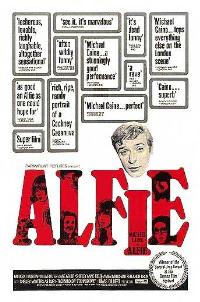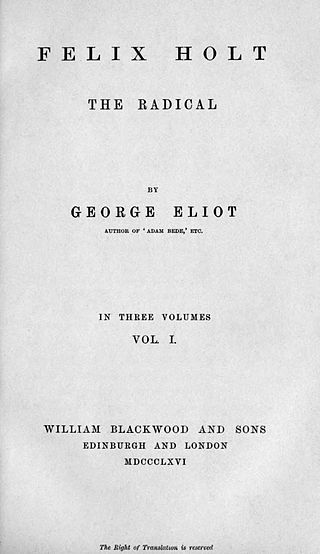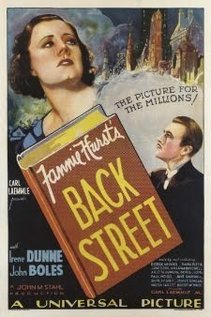
Frances Burney, also known as Fanny Burney and later Madame d'Arblay, was an English satirical novelist, diarist and playwright. In 1786–1790 she held the post of "Keeper of the Robes" to Charlotte of Mecklenburg-Strelitz, George III's queen. In 1793, aged 41, she married a French exile, General Alexandre d'Arblay. After a long writing career and wartime travels that stranded her in France for over a decade, she settled in Bath, England, where she died on 6 January 1840. The first of her four novels, Evelina (1778), was the most successful and remains her most highly regarded, followed by Cecilia (1782). Most of her stage plays were not performed in her lifetime. She wrote a memoir of her father (1832) and many letters and journals that have been gradually published since 1889, forty-nine years after her death.

Alfie is a 1966 British comedy-drama film directed by Lewis Gilbert and starring Michael Caine. The Paramount Pictures release was adapted from the 1963 play of the same name by Bill Naughton. Following its premiere at the Plaza Theatre in the West End of London on 24 March 1966, the film became a box office success, enjoying critical acclaim, and influencing British cinema.

Middlemarch, A Study of Provincial Life is a novel by English author George Eliot, the pen name of Mary Ann Evans. It appeared in eight installments (volumes) in 1871 and 1872. Set in Middlemarch, a fictional English Midlands town, in 1829 to 1832, it follows distinct, intersecting stories with many characters. Issues include the status of women, the nature of marriage, idealism, self-interest, religion, hypocrisy, political reform, and education. Despite comic elements, Middlemarch uses realism to encompass historical events: the 1832 Reform Act, early railways, and the accession of King William IV. It looks at medicine of the time and reactionary views in a settled community facing unwelcome change. Eliot began writing the two pieces that formed the novel in 1869–1870 and completed it in 1871. Initial reviews were mixed, but it is now seen widely as her best work and one of the great English novels.

Daniel Deronda is a novel written by English author George Eliot, first published in eight parts (books) February to September 1876. It was the last novel she completed and the only one set in the Victorian society of her day. The work's mixture of social satire and moral searching, along with its sympathetic rendering of Jewish proto-Zionist ideas, has made it the controversial final statement of one of the most renowned Victorian novelists.

Bleak House is a novel by Charles Dickens, first published as a 20-episode serial between March 1852 and September 1853. The novel has many characters and several subplots, and is told partly by the novel's heroine, Esther Summerson, and partly by an omniscient narrator. At the centre of Bleak House is a long-running legal case in the Court of Chancery, Jarndyce and Jarndyce, which comes about because a testator has written several conflicting wills. In a preface to the 1853 first edition, Dickens said there were many actual precedents for his fictional case. One such was probably Thellusson v Woodford, in which a will read in 1797 was contested and not determined until 1859. Though many in the legal profession criticised Dickens's satire as exaggerated, Bleak House helped support a judicial reform movement that culminated in the enactment of legal reform in the 1870s.

Anne Hathaway was the wife of William Shakespeare, an English poet, playwright and actor. They were married in 1582, when Hathaway was 26 years old and Shakespeare was 18. She outlived her husband by seven years. Very little is known about her life beyond a few references in legal documents. Her personality and relationship to Shakespeare have been the subject of much speculation by many historians and writers.

Down to the Sea in Ships is a 1922 American silent romantic drama film about a 19th-century Massachusetts whaling family. Directed by Elmer Clifton, the film stars William Walcott, Marguerite Courtot, and Clara Bow. The film's title comes from Psalm 107, verses 23–24.
Ann Turnbull is a British writer of fiction for children and young adults. Her work includes Pigeon Summer, a novel set in a Midlands mining town during the Great Depression of the 1930s which is about a young girl named Mary Dyer, and No Shame, No Fear, a novel for young adults that depicts the persecution of Quakers during the 1660s, and is set in both Shropshire and London and was shortlisted for the Guardian Children's Fiction Prize. Pigeon Summer was nominated for the Nestle Smarties Book Prize and No Shame, No Fear was nominated for the Whitbread Book Award. She has written a number of picture books but the best known is The Sand Horse which is illustrated by Michael Foreman.

The Moving Finger is a detective novel by British writer Agatha Christie, first published in the USA by Dodd, Mead and Company in July 1942 and in the UK by the Collins Crime Club in June 1943. The US edition retailed at $2.00 and the UK edition at seven shillings and sixpence.

The Witch of Blackbird Pond is a children's novel by American author Elizabeth George Speare, published in 1958. The story takes place in late 17th-century New England. It won the Newbery Medal in 1959.

Felix Holt, the Radical (1866) is a social novel written by English author George Eliot about political disputes in a small English town at the time of the First Reform Act of 1832.

Forged in the Fire is a 2006 novel for young adults by Ann Turnbull, about Quaker life in the 1660s. It is the sequel to No Shame, No Fear, published in 2003.

Judith Quiney, née Shakespeare, was the younger daughter of William Shakespeare and Anne Hathaway and the fraternal twin of their only son Hamnet Shakespeare. She married Thomas Quiney, a vintner of Stratford-upon-Avon. The circumstances of the marriage, including Quiney's misconduct, may have prompted the rewriting of Shakespeare's will. Thomas was struck out, while Judith's inheritance was attached with provisions to safeguard it from her husband. The bulk of Shakespeare's estate was left, in an elaborate fee tail, to his elder daughter Susanna and her male heirs.

Back Street is a 1932 American pre-Code drama film directed by John M. Stahl and starring Irene Dunne and John Boles. Based on the best-selling of the same title by Fannie Hurst, it tells the story of a woman who spends her life as the secret mistress of a wealthy married man. The devotion and love of the woman to the married man determines that she will be the “back streets” of him in the whole life; a story of a love that was not destined. This was the first of three film versions of Hurst's novel; remakes were released in 1941 and 1961.

A Waste of Shame is a 90-minute television drama on the circumstances surrounding William Shakespeare's composition of his sonnets. It takes its title from the first line of Sonnet 129. It was first broadcast on BBC Four on 22 November 2005 as part of the supporting programming for the BBC's ShakespeaRe-Told season, but was only loosely connected to the rest of the series.

William Penn was an English writer, religious thinker, and influential Quaker who founded the Province of Pennsylvania during the British colonial era. Penn, an advocate of democracy and religious freedom, was known for his amicable relations and successful treaties with the Lenape Native Americans who had resided in present-day Pennsylvania prior to European settlements in the state.

Maria Bertram is a fictional character in Jane Austen's 1814 novel, Mansfield Park.

The Newington Academy for Girls, also known as Newington College for Girls, was a Quaker school established in 1824 in Stoke Newington, then north of London. In a time when girls' educational opportunities were limited, it offered a wide range of subjects "on a plan in degree differing from any hitherto adopted", according to the prospectus. It was also innovative in commissioning the world's first school bus. One of its founders was William Allen, a scientist and businessman active with the Society for Effecting the Abolition of the Slave Trade.

The Romance of a Shop is an 1888 novel by Amy Levy. The novel centers on the Lorimer sisters, who decide to open their own photography business after the death of their father leaves them in poverty. The novel examines the opportunities and difficulties of urban life for the "New Woman" in the late nineteenth century, maintaining their right to independent opinion and the questioning of social norms.

Susanna Corder was an educationist and Quaker biographer.



















